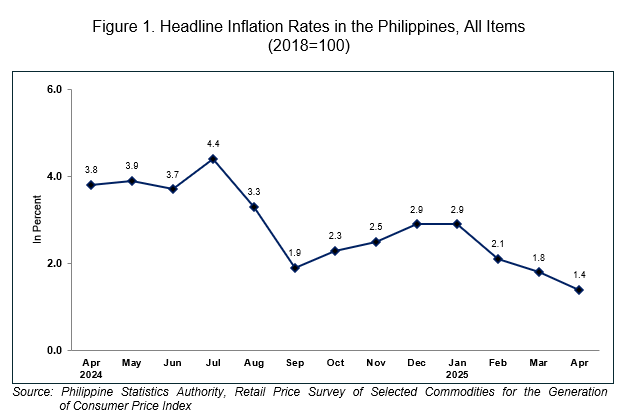Consumer prices continued its downward trend in April, falling to 1.4 percent – the lowest rate since November 2019, the Philippine Statistics Authority (PSA) said.
Food inflation also dropped sharply, slowing to 0.7 percent from 2.3 percent in March 2025 and from 6.3 percent in April 2024.
This was mainly due to the continued improvements in the prices of rice, which dropped to 10.9 percent from 23.9 percent a year ago, following a 7.7 percent decline in March 2025.
“We are encouraged that our initiatives to enhance supply and stabilize agricultural commodity prices are easing the financial burden on millions of Filipino consumers, especially low-income families,” said Agriculture Secretary Francisco Tiu-Laurel Jr.
The PSA also reported slower inflation for vegetables, tubers, plantains, cooking bananas, meat, fruits, fish, and other seafood, signaling a broader easing of food costs.
Finance Secretary Ralph Recto said the drop in the country’s inflation rate to a pre-pandemic low “reinforces the government’s determination to ensure that this welcome relief continues to be felt by every Filipino household.”
He said year-to-date, the average inflation rate fell to 2 percent, sitting comfortably at the lower end of the government’s target range of 2 percent to 4 percent.
“This lower-than-expected inflation rate for the month also provides more room for the BSP (Central Bank) to further cut policy interest rates to help us further boost the spending power of Filipinos, drive in more investments, and grow the economy, especially amid rising global uncertainties,” Recto said.
Inflation for households in the bottom 30 percent income bracket likewise slipped to a record low of 0.1 percent in April.
The BSP said the latest inflation outturn is consistent with its assessment of a manageable inflation environment, aided primarily by the continued easing of commodity price pressures.
“The risks to the inflation outlook also continue to be broadly balanced for 2025 to 2027. Upside pressures come from possible increases in transport charges, meat prices, and utility rates. Meanwhile, downside risks are linked to the continuing effects of lower tariffs on rice imports and the expected impact of weaker global demand,” BSP said.
“The sustained slowdown in inflation, driven largely by the significant decline in food prices, is a positive sign that our policy interventions are working. We will continue to implement strategies to vigilantly monitor price shocks and proactively temper inflationary pressures,” added DEPDev Undersecretary for Planning and Policy Group Rosemarie Edillon.
Among the government’s ongoing efforts are initiatives by the Department of Agriculture, including the close monitoring of agricultural production and market prices, particularly for high-value crops such as vegetables, which are vulnerable to the ongoing extreme summer heat and are primarily sourced from northern regions.
“We must continue to push for decisive coordination to ensure price stability, especially for essential commodities. Our goal is not only to reduce inflation but to ensure that its benefits are felt by every Filipino household—through lower food costs and improved access to basic goods,” Edillon added.
Malacañang said the significant drop in the country’s inflation rate reflects the Marcos administration’s sustained efforts to maintain price stability and support the broader economy.
“The decrease in the inflation rate is proof that President Marcos Jr. and the administration’s efforts to strengthen our economy are continuing,” Palace Press Officer Claire Castro said.
Speaker Martin Romualdez said it was “a concrete proof that the government’s measures have a real impact on the lives of ordinary Filipinos.”
“This number shows that the price of basic commodities – from rice, vegetables, and meat, to electricity and fares – is now more under control. This means that daily expenses are more affordable, and the ability of every Filipino family to meet their income is expanding,” he said.
“This is not just a result of luck. This is the result of the clear direction and firm leadership of President Marcos, along with the entire Congress that is his partner in passing reforms and laws aimed at strengthening the economy, lowering commodity prices, and creating more jobs,” he added.







